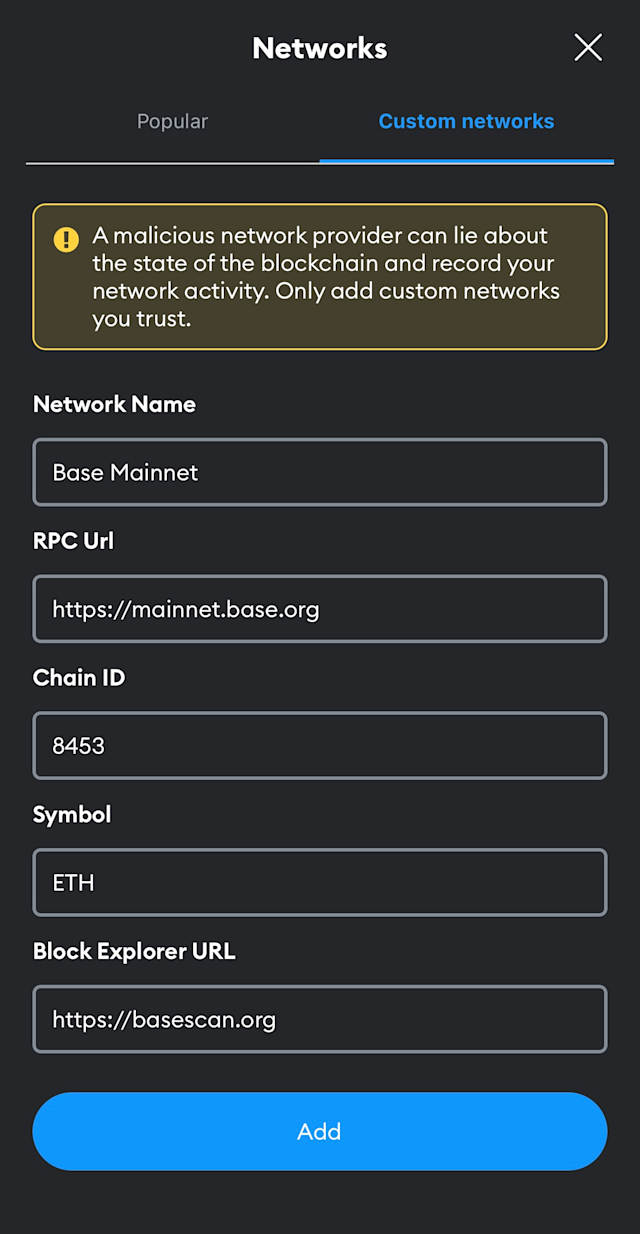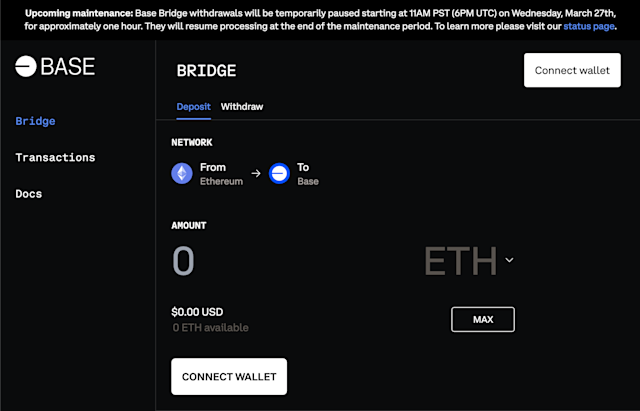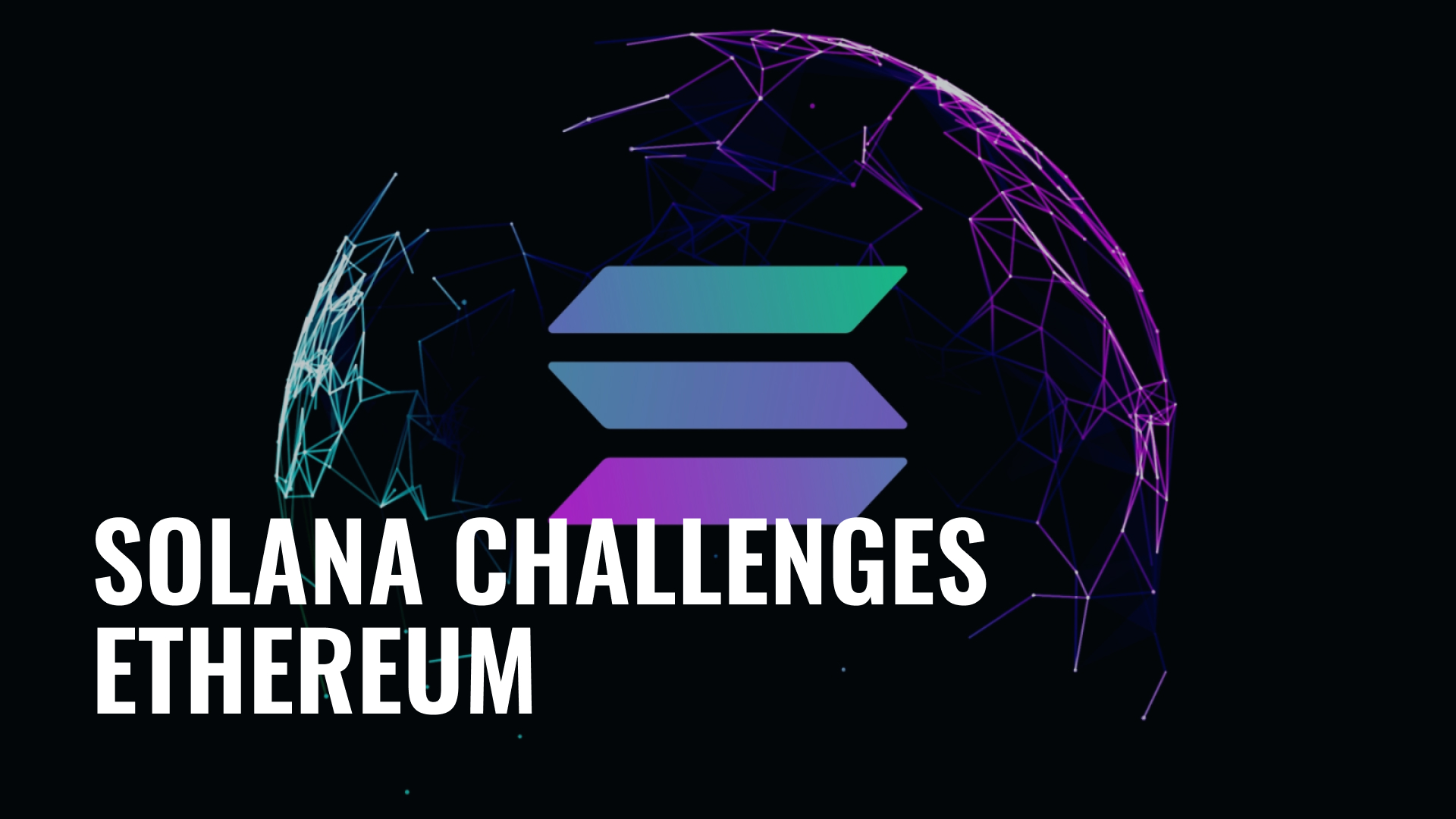Base Chain: Functionality, EVM Compatibility, and Setup Insights - All Inclusive Guide

What is Base Chain?
Developed by Coinbase, Base Chain is a layer-2 blockchain solution crafted to complement and enhance the Ethereum ecosystem by improving its scalability and efficiency. This platform is engineered to be secure, affordable, and conducive to developer activity, promoting the expansion of web3 application development.
Leveraging the OP Stack technology from Optimism, Base Chain aims to facilitate the broader adoption of decentralized technologies and create a more inclusive digital future.
How does Base Chain work?
Base is an optimistic rollup, utilizing the OP Stack for its operations. It functions by processing transactions away from the main Ethereum blockchain (Layer 1) and then logging them back onto it. This method aims to lower transaction fees and alleviate network congestion. Here's an overview simplified:
Base handles most transactions and computations off the Ethereum main chain, allowing for the simultaneous handling of numerous transactions. This significantly alleviates network congestion and boosts transaction speed.
Following the off-chain processing, Base consolidates these transactions into batches before reintegrating them onto the Ethereum main chain. This method efficiently minimizes the volume of data on the main chain, thereby reducing the costs associated with transactions (gas fees).
While operating off-chain, Base ensures the security and integrity of transactions by adhering to the Ethereum main chain's security protocols, safeguarding all activities against security breaches.
How to use Base Chain?
Base can be integrated as a custom network into any wallet compatible with Ethereum Virtual Machine (EVM), such as MetaMask.
MetaMask
To add Base as a custom network to MetaMask:
Open the MetaMask browser extension.
Open the network selection dropdown menu by clicking the dropdown button at the top of the extension.
Click the Add network button.
Click Add a network manually.
In the Add a network manually dialog that appears, enter the following information for Base mainnet: Network Name: Base Main Description: The public mainnet for Base. RPC Endpoint: https://mainnet.base.org Chain ID: 8453 Currency Symbol: ETH Block Explorer: https://basescan.org
You should now be able to connect to the Base by choosing it from the network selection dropdown menu.

Bridges
To transfer your assets to Base, you have the choice of using the official Base Bridge for a straightforward transfer or opting for an alternative cross-chain bridge if you're looking to minimize gas costs. Here's what you need to know to get started.
Oficial Base Bridge
Opting for the official bridge created by the Base team is a solid choice for those looking to transfer assets directly from the Ethereum Mainnet. This method might come with higher transaction costs, with gas fees fluctuating between $5 and $30 based on network activity. To minimize costs, it's advisable to perform transactions during off-peak hours or explore alternative bridging options, noting that Base itself doesn't impose any extra fees.
How to Use Official Base Bridge
Visit the official bridge at bridge.base.org.
In the website's upper right corner, find and click to connect your wallet.
The Base Network should be automatically configured within your wallet. If this step doesn't happen automatically, manually add the Base Network by following the steps above.
Enter the amount of ETH to transfer to the Base Network.
Lastly, confirm the transaction details and proceed. The transfer should complete within a few minutes, depending on current network conditions.
This process provides a straightforward path to leveraging the Base Network's capabilities, ensuring users can efficiently manage their assets between Ethereum and Base.

Third Party Bridges
If you are looking for lower fees there are a a variety of external bridges available, each supporting connections with multiple networks to suit specific needs..
Rango Exchange: 50+ networks supported
Orbiter Finance: 19 networks supported.
Portal Bridge: 23+ networks supported
RhinoFi: 15 networks supported.
LayerSwap: 25+ networks supported.
Owlto Finance: 15+ networks supported.
When opting for third-party bridges for asset transfers, it's essential to balance lower fees against security and support levels, which might not match those of official bridges. These alternatives offer more network compatibility and features but may pose additional risks, including weaker security measures. Before using a third-party bridge, conducting diligent research into its reputation, user experiences, and security assessments is crucial.
Partnerships
Coinbase's involvement in the development of a Base Chain significantly enhances the platform's appeal to both developers and businesses. Developers are presented with a vibrant and sturdy ecosystem conducive to the creation of their apps, bolstered by the assurance of a readily available market for their innovations. Businesses, conversely, might interpret this collaboration as an indication of the platform's dependability and steadiness, thereby increasing their inclination to employ this technology for their blockchain needs.
In addition, the compatibility of Base with the Ethereum Virtual Machine (EVM) facilitates effortless interactions with decentralized applications initially devised for Ethereum and other EVM-compatible blockchains. This interoperability is evidenced by the integration of several EVM-centric applications with Base, including prominent platforms such as OpenSea, Aave, PoolTogether, Uniswap, Galxe, Iskra, and Pixelmon, all of which have utilized Base's capabilities to broaden their operational scope.
Ex-crypto miner and crypto enthusiast since 2019.


